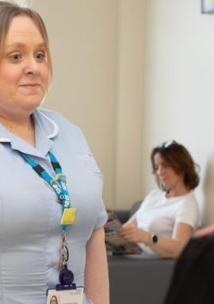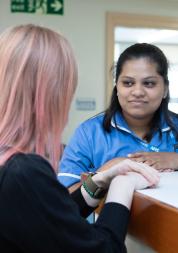Cervical screening my way
Healthwatch England unpacks women's experiences of cervical screening and sets out recommendations for healthcare leaders. Earlier this year, Healthwatch Brighton and Hove captured local women's experiences to feed into this national report.

This report unpacks women's experiences of cervical screening and sets out recommendations for healthcare leaders.
In 2023, NHS England set a target to eliminate cervical cancer by 2040. It's an admirable but challenging goal, set against declining levels of uptake by women of cervical screening over the past 20 years.
In response, we launched research to investigate why some women are hesitant to go for screening, to make recommendations to policymakers on how to improve uptake and to help meet the elimination goal.
Methodology
Conducted between November 2023 and February 2024, our research consists of:
- A poll of more than 2,400 women who were hesitant about cervical screening.
- Interviews of 30 younger, disabled, or minority ethnic women, to amplify voices that are not always heard and who generally face service barriers.
Key findings
- The top reasons for hesitancy among respondents were worries about physical discomfort, embarrassment at undressing in front of healthcare professionals and a belief they didn't have to go because they weren't currently sexually active.
- Women felt NHS information describing the purpose of cervical screening was good/clear (78%), but fewer (58%) said it explained Human Papillomavirus (HPV) the leading cause of cervical cancer.
- Some women didn't receive accessible or translated information to enable them to understand the invitations and make an informed decision about attending screening.
- Most women (81%) who'd attended screening previously said staff treated them with respect. However, only a third (33%) felt they'd been able to ask staff for practical changes that could make them feel comfortable in appointments.
- There was strong support (73%) for home testing – currently being considered as an option by screening experts - if it was offered free on the NHS.
- There are major gaps in national data on the diversity of women who attend cervical screening.
- In-depth interviews with women provide examples of innovative practices that improve uptake among diverse women.
Recommendations at a glance
Our recommendations to policymakers include calls for:
- NHS England to investigate solutions to ensure that disability and ethnicity data about people attending screening can be captured, analysed, and published alongside regional and age uptake data in the future. This would allow for a more comprehensive picture of uptake among diverse groups.
- NHS England to address the gap left by the closure of Jo's Cervical Cancer Trust (the only charity and national helpline dedicated solely to cervical cancer), with high-profile promotion of alternative, trusted sources of direct support and information for women.
- Screening providers to ensure they train and enable admin and screening staff to meet their responsibilities regarding accessible information and adjustments to care.
- Screening providers, working with local Healthwatch, to seek feedback from their local communities to understand views on booking methods, appointment times and preferred locations for drop-in clinics. Services should adapt access accordingly to help increase uptake.
- NHS England to introduce an NHS-branded Trauma Card, based on a Healthwatch Essex initiative for affected women to bring to appointments.
- Subject to the results of NHS-commissioned research on the safety and effectiveness of self-screening, the NHS should adopt self-screening as an alternative option offered to all women nationally who would prefer it. Instructions for their use should be co-designed with women.
Experiences of people in Brighton and Hove
Our interview with a young women highlighted the following barriers to taking up a cervical screening:
- A lack of compassion from some clinicians - not always being sensitive to past medical / personal experiences
- A mistrust of the NHS in relation to women’s health - largely from negative anecdotal experiences of friends
- Health anxiety - e.g. worried about receiving bad news
Suggestions for improvements:
- Improved communication
- Ensuring dignity
- Offering reassurance and better information around self-screening
Downloads
Download the full report below If you need this report in a different format, please email enquiries@healthwatch.co.uk or call 030000 68 3000.
